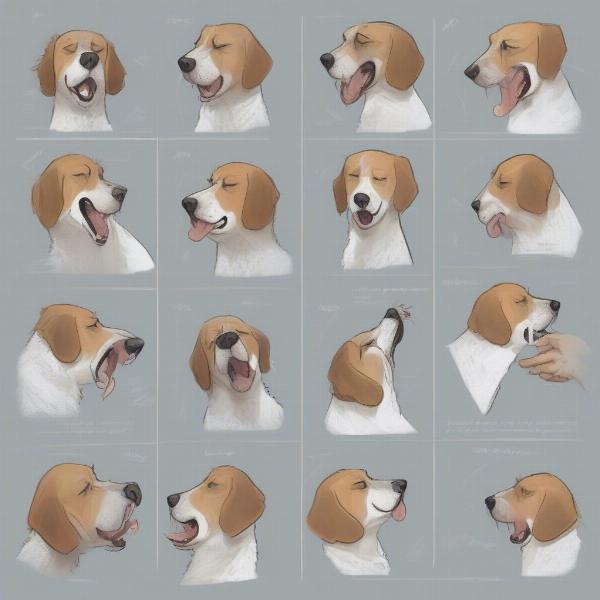A dog’s respiratory rate, simply put, is the number of breaths they take per minute. While seemingly simple, this vital sign can offer crucial insights into your dog’s overall health. Monitoring your dog’s respiratory rate, especially when they’re at rest, can help you detect potential health issues early on, allowing for prompt veterinary intervention. This article will delve into what’s considered a normal respiratory rate, how to measure it accurately, and when changes in breathing should raise a red flag.
What is a Normal Dog Respiratory Rate?
A healthy dog at rest typically breathes between 10 and 30 breaths per minute. Puppies and smaller breeds tend to have faster respiratory rates than larger, adult dogs. Factors like temperature, activity level, and stress can also influence a dog’s breathing. It’s essential to establish your dog’s baseline respiratory rate when they are calm and relaxed. This will provide a valuable reference point for comparison should they become ill or injured.
How to Measure Your Dog’s Respiratory Rate
Measuring your dog’s respiratory rate is straightforward. While your dog is at rest and undisturbed, observe their chest movements. Each rise and fall of the chest counts as one breath. Use a timer or watch with a second hand and count the number of breaths your dog takes in one minute. Alternatively, you can count the breaths in 15 seconds and multiply by four to get the breaths per minute.
Tips for Accurate Measurement
- Choose a Quiet Time: Ensure your dog is relaxed and not panting from recent exercise or excitement.
- Observe Discreetly: Avoid startling your dog, as this can alter their breathing pattern.
- Count Chest Movements: Focus on the rise and fall of the chest, not the flaring of nostrils.
- Repeat Several Times: Take multiple readings to ensure accuracy and consistency.
When to Worry About Your Dog’s Breathing
While slight variations in breathing are normal, significant changes or labored breathing can indicate a problem. If your dog’s respiratory rate falls outside the normal range (10-30 breaths per minute) or you observe any of the following signs, contact your veterinarian immediately:
- Rapid, shallow breathing (tachypnea)
- Labored breathing (dyspnea)
- Blue-tinged gums or tongue (cyanosis)
- Excessive panting
- Wheezing or coughing
- Noisy breathing
- Open-mouth breathing (in non-brachycephalic breeds)
 Abnormal Dog Breathing
Abnormal Dog Breathing
These signs can indicate various underlying health issues, such as respiratory infections, heart problems, heatstroke, or pain. Early diagnosis and treatment are crucial for a positive outcome.
Conclusion
Understanding your dog’s respiratory rate is a simple yet powerful tool for monitoring their health. By regularly checking their breathing and being aware of the signs of respiratory distress, you can help ensure your furry friend receives the timely veterinary care they need. Remember, changes in your dog’s respiratory rate can be an early indicator of illness, so don’t hesitate to contact your vet if you have any concerns.
FAQ
- What is considered a normal dog respiratory rate? A normal resting respiratory rate for dogs is between 10 and 30 breaths per minute.
- How do I measure my dog’s respiratory rate? Count the number of chest rises and falls in one minute while your dog is at rest.
- When should I be concerned about my dog’s breathing? Contact your vet if your dog’s breathing is rapid, labored, noisy, or accompanied by blue-tinged gums.
- What can cause changes in a dog’s respiratory rate? Various factors, including exercise, stress, temperature, and underlying health conditions, can affect a dog’s breathing.
- Is it normal for puppies to breathe faster than adult dogs? Yes, puppies and smaller breeds tend to have higher respiratory rates.
Related Articles
- rain jacket disney cats and dogs collection print
- dog jacket rain
- yellow rain jacket for dogs
- waterproof rain jacket for dogs
About ILM Dog
ILM Dog (https://ilmdog.com) is your trusted source for comprehensive information on dog care, offering expert advice on everything from breed selection and health to training, nutrition, and grooming. We strive to empower dog owners worldwide with the knowledge and resources they need to provide the best possible care for their canine companions. For expert advice on dog health and wellness, contact us at [email protected] or +44 20-3965-8624.